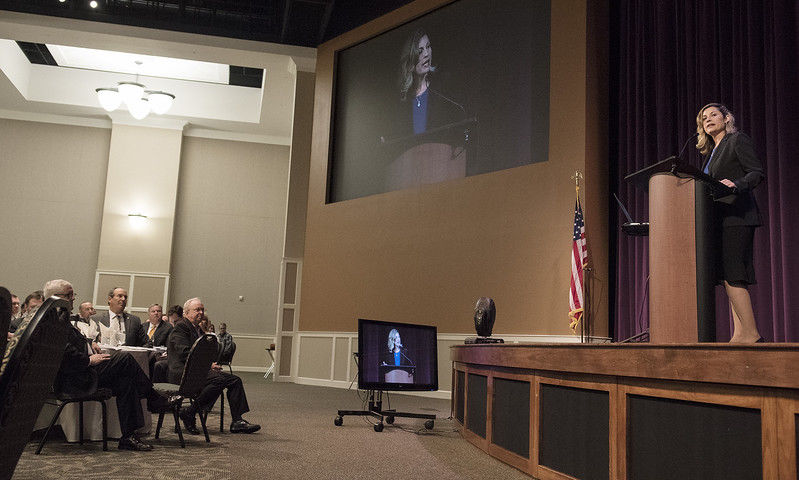Oil and gas industry has an image problem, Tyler Area Energy Summit speakers agree
Published 5:28 pm Monday, March 27, 2017

- Jacki Pick, host of The Jacki Daily Show on Glenn Beck's The Blaze Radio Network, speaks during the Tyler Area Energy Summit Monday March 27, 2017 at the Green Acres Baptist Church Crosswalk Conference Center. (Sarah A. Miller/Tyler Morning Telegraph)
With a new energy-friendly presidential administration and rising petroleum prices, the oil and gas industry is set for a rebound, speakers at the 2017 Tyler Area Energy Summit told a packed audience Monday.
The biggest obstacle is its own image, speakers agreed. Political groups opposed to fossil fuels and hydraulic fracturing (fracking) are winning the arguments – and voters.
“It is no secret that the oil and gas industry has an image problem,” said Jacki Pick of the National Center for Policy Analysis and the Jacki Daily Show on The Blaze network. “We don’t do a very good job of explaining the value of the industry. All of these activists seem to not understand that.”
Polls consistently show that public relations wars waged against fracking and the larger oil and gas energy sector are working. Ms. Pick cited a Gallup poll showing that opposition to fracking increased from 40 percent to 51 percent in 2015.
“And the biggest drop in support came from Republicans,” she added. “So preaching to the choir is pretty important. We know that most Americans now consider fracking to be a negative term. What we’re doing is not working. We’re not getting through. We can’t afford to go any lower in the polls.”
Ms. Pick pointed to the 2014 fracking ban approved by Denton voters (which led to a state law in 2015 that banned such bans).
“Our side is not showing up to the fight,” she told the room at Green Acres Crosswalk Conference Center full of energy producers. “Public relations has not, historically, been a core function of oil and gas companies. That’s understandable, but I think there’s been a realization that this can no longer be ignored.”
The solution is simple, but not easy, she said.
“We must fix the piece missing in this sector: Messaging to the public,” Ms. Pick said. “You look at what you’ve done well and you’re honest about what needs improvement. Even the EPA admits that fracking doesn’t contaminate ground water. But no one is pushing that message out to the public… I’m not talking about propaganda here. I’m talking about getting the truth out. We have to engage.”
Texas Railroad Commissioner Wayne Christian agreed.
“We are acting as an industry as if we’re selling tobacco,” said Christian, who served in the Texas Legislature as a state representative from Center for seven terms. “We’re about to see the biggest economic boom we’ve ever seen because of the new administration – God has blessed Texas. But, we have got to stop apologizing for what we do.”
Ken Morgan, PhD., director of the Texas Christian University’s Energy Institute, added a global perspective.
“There’s a global energy dilemma,” he explained. “There are three things you have to have – food, water, energy. You’d better have them all, but energy is the lynchpin. We won’t help Africa by sending them gift baskets. If they have energy, they will see real improvement. They’ll have hospitals that run 24 hours. They’ll have industry.”
Morgan agreed that oil and gas have an image problem. Worries about fracking are baseless, he said, while science says that alternatives – including wind and solar power – have problems of their own that get little publicity.
All of those advanced technologies rely on rare earth metals, he pointed out.
“China controls 97 percent of the world’s supply of rare earth metals,” he said. “Do you think China is worrying about the environmental impact (of extracting them)?”
Producing one ton of rare earth metals, he said, results in one ton of liquid radioactive thorium waste. Plus, 10,000 cubic meters of waste gases, and 2,000 tons of mine tailings. Extracting rare earth metals is environmentally devastating, Morgan said.
“And just one wind turbine in West Texas uses 1,000 pounds of rare earth metals,” he said. “That’s half a ton.”
There are three realities – Morgan called them laws – of energy production.
“There is no free energy,” he said. “There’s always a price; with any energy use, always waste and pollution.”
And finally, he added, “You must use energy.”
The U.S. oil and gas industry is poised to rebound, Morgan said. And, it has a good story to tell – about how inexpensive energy improves lives enormously, in multiple ways.
But the industry has to do a better job of telling its own story, particularly to young people, he said.
“They just don’t have the facts,” he said. “That’s our job. If you have gray hair, you can help.”
The Tyler Area Energy Summit was hosted by the Tyler Area Chamber of Commerce’s Energy Committee, along with the Chamber, and a number of sponsors.
Twitter: @tmt_roy






